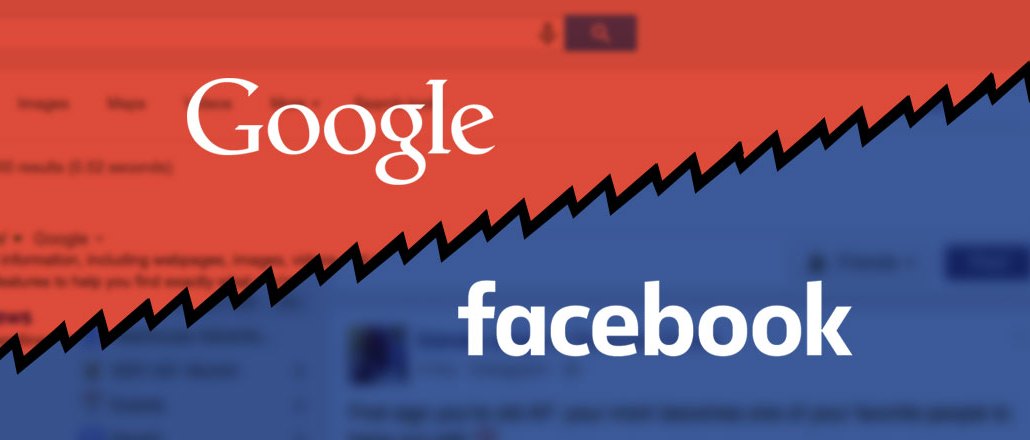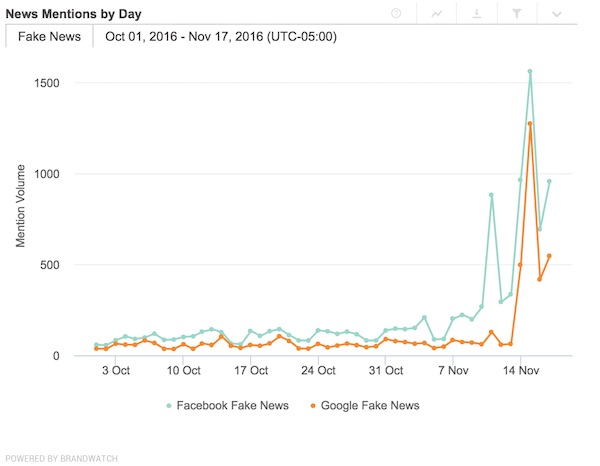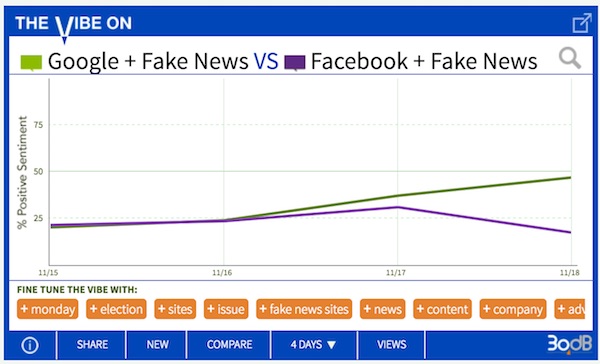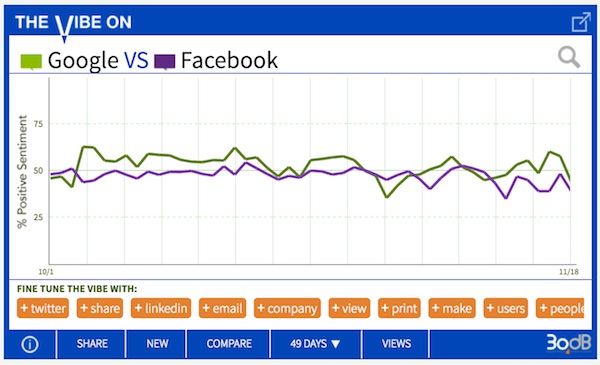Last chance to save on Digiday Publishing Summit passes is February 9

Fake news has become such a hot-button topic that even President Obama chimed in to criticize the rampant spread of misinformation online.
Google and Facebook have both been criticized for allowing false stories to proliferate online during the presidential election. Although both companies recently banned fake news sites from their ad networks, Google has been more forthcoming about the problem. And data shows that Google has had more success than Facebook in detaching itself from the false-news albatross.
When it comes to purging fake news “it feels like Google is a few steps ahead of where Facebook should be,” said Sachin Kamdar, co-founder and CEO of social analytics company Parse.ly.
While CEO Mark Zuckerberg initially tried to downplay the prevalence of fake news on Facebook, Google admitted that the company “didn’t get it right” when an untrue article was displayed prominently in its search results. Google also made a timely announcement that it would fund fact-checking projects aimed at cleaning up fake news online.
To Facebook’s credit, Zuckerberg over the weekend outlined several possible approaches Facebook was considering to limit the reach of fake news. Although it’s unclear how Facebook will facilitate its goals of “easy reporting” or “disrupting fake news economics,” Zuckerberg’s post indicates that the company is now making the battle with fake news a priority. Google and Facebook declined to comment for this article.
Brandwatch data shows that “fake news” was mentioned much more often in the press since the election, and that Facebook was mentioned more frequently than Google in these articles.

And it’s not just in the press where Google is winning the PR battle. As seen in the below chart, 30db found that online mentions of fake news last week were more likely to be positive when they were associated with Google than when they were associated with Facebook.
Google has been “a little more on top of things than Facebook” in addressing fake news because Google’s business model relies more on accuracy, said Kelly McBride, who teaches ethics at The Poynter Institute. Fake news can undermine search results, and that would be a major problem for Google users who use actively seek reliable information. Facebook, on the other hand, is built around giving people a positive or powerful experience, and its users are less likely to be dismayed if they passively come across fake news as long as it makes them happy, she said.
“Facebook is a platform for what’s popular, not what’s credible,” said Justin Choi, founder and CEO of native ad platform Nativo.

Although many articles, like the one you are reading right now, have chastised Facebook for creating what a former Facebook news curator called a “petri dish of bullshit,” the criticism primarily occurs in a media bubble. The chart below shows that people’s sentiment regarding Facebook and Google has barely budged in the last month and a half.
“The impact on the brand perception is probably limited,” said Joshua Benton, director of the Nieman Journalism Lab. “Because for the people who [sharing fake news] is a problem for, they probably don’t see it as a problem.”

More in Media

In Graphic Detail: The scale of the challenge facing publishers, politicians eager to damage Google’s adland dominance
Last year was a blowout ad revenue year for Google, despite challenges from several quarters.

Why Walmart is basically a tech company now
The retail giant joined the Nasdaq exchange, also home to technology companies like Amazon, in December.

The Athletic invests in live blogs, video to insulate sports coverage from AI scraping
As the Super Bowl and Winter Olympics collide, The Athletic is leaning into live blogs and video to keeps fans locked in, and AI bots at bay.





